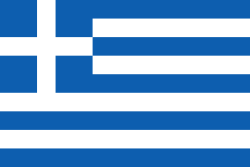
Back قومية يونانية Arabic Грэчаскі нацыяналізм Byelorussian Гръцки национализъм Bulgarian ناسیۆنالیزمی یۆنانی CKB Ελληνικός εθνικισμός Greek Nacionalismo griego Spanish Panhellenismi Finnish Nationalisme grec French Nacionalismo grego Galician Nasionalisme Yunani ID

Greek nationalism, otherwise referred to as Hellenic nationalism, refers to the nationalism of Greeks and Greek culture.[1] As an ideology, Greek nationalism originated and evolved in classical Greece.[2][3][4] In modern times, Greek nationalism became a major political movement beginning in the early 19th century, which culminated in the Greek War of Independence (1821–1829) against the Ottoman Empire.[1]
Greek nationalism became also a potent movement in Greece shortly prior to, and during World War I, when the Greeks, inspired by the Megali Idea, managed to liberate parts of Greece in the Balkan Wars and after World War I, briefly occupied the region of Smyrna before it was retaken by the Turks.[1]
Greek nationalism was also the main ideology of two dictatorial regimes in Greece during the 20th century: the 4th of August Regime (1936–1941) and the Greek military junta (1967–1974). Today Greek nationalism remains important in the Greco-Turkish dispute over Cyprus[1] among other disputes (Greek nationalism in Cyprus).
- ^ a b c d Motyl 2001, "Greek Nationalism", pp. 201–203.
- ^ Cite error: The named reference
Burckhardtwas invoked but never defined (see the help page). - ^ Cite error: The named reference
Wilsonwas invoked but never defined (see the help page). - ^ Cite error: The named reference
Vasiliev582was invoked but never defined (see the help page).
© MMXXIII Rich X Search. We shall prevail. All rights reserved. Rich X Search